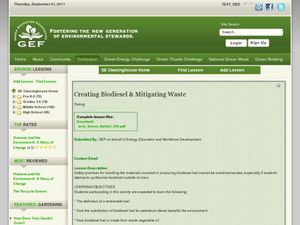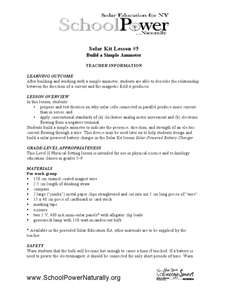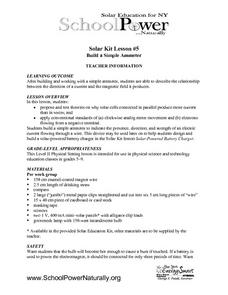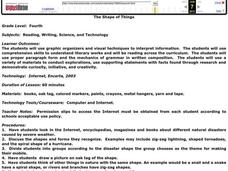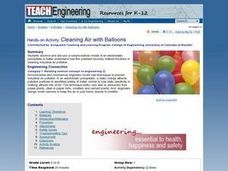Curated OER
Big Boats Up The River
Using boats along in the Port of Albany as the focus, learners practice adding single-digit numbers and interpreting data. This lesson comes with the worksheets, resource links, and other materials to make it a worthwhile experience.
Curated OER
Creating Biodiesel and Mitigating Waste
Biotechnology pros produce their own biofuel using waste oil and fresh vegetable oil. They test the quality of their product using titration techniques and pH analysis. They write their observations and report their findings. Be aware...
Curated OER
Solar Kit Lesson #9 - Properties of Solar Radiation: Reflection, Transmission, and Absorption
Middle school science stars observe and record data on the solar radiation reflected off or transmitted through various materials. They predict properties for various materials, and test their predictions by touch. This lesson becomes...
Curated OER
Falling Objects
High schoolers examine the velocities of two different falling objects. They produce distance vs. time and velocity vs. time graphs using a Motion Detector and a CBL 2 to collect experimental data. Learners analyze and interpret the...
Curated OER
Solar Kit Lesson #5 - Build a Simple Ammeter
Emerging electricians build a simple ammeter for making measurements on an electric current. They test the placement of solar cells in both series and parallel circuits and examine the magnetic field produced by the movement of electrons...
Curated OER
The Chemistry of Refining Crude Oil
Consider our energy sources: wood, coal, oil, uranium. Learners compare the pollution to energy produced for each. They practice fractional distillation of an alcohol/water mixture to simulate the process of refining crude oil....
Curated OER
Basic Orienteering
Students study orienteering. In this science instructional activity, students study the parts of a compass and use the compass to set a bearing and follow the bearing on the compass.
Curated OER
The Big Book of Judgment
Students make a book to learn about judging fairly and practicing fairness. In this judgment lesson, students discuss judgment and fairness by defining the words. Students assemble a book for the terms.
Curated OER
Sea Connections: Marine Ecosystems
Students identify producers and consumers from marine ecosystems and describe the balance among them in the environments. After constructing a food chain from a marine ecosystem, they examine human activities that can upset the balance...
Curated OER
Robot Earth
Students construct a simple robotic energy transformer. For this space science lesson, students explain how energy is transformed from one form to another. They identify the different uses of robotic devices.
Curated OER
Mapping the Ocean Floor
Students study the bottom structure of underwater habitats and how they can be mapped.
Curated OER
We Have Work To Do - Science
Students begin to think of ways to make work easier. They will focus on ways to extend their abilities to lift heavy things. They will identify levers, pulleys, and inclined planes through the examination of concrete objects and hands on...
Curated OER
Build a Simple Ammeter
Students build and work with a simple ammeter to test theories on why solar cells connected in parallel produce more current that in series. Students use the ammeter to indicate the presence, direction, and strength of an electric...
Curated OER
Making Movie Storyboards
Students explore the importance of images in telling a story in film, analyze movie clips and identify some visual cues that help them explain the story; students work collaboratively to storyboard a passage from a book and present them...
Curated OER
Attributes of Accuracy
Young scholars explain necessity in using accurate instruments when measuring, and how measurements can be checked for accuracy. They make a six-inch ruler, design, test, and evaluate a system to measure work, and produce a table and...
Curated OER
The Shape of Things
Fourth graders develop their writing skills. In this paragraph structure lesson, 4th graders research natural disasters, compile their findings, create mobiles and write stories based on the mobiles.
Curated OER
Understanding Stage Design: Using Visual Elements to Provide Information to an Audience
Students study about theatrical design by developing environments for improvised and scripted scenes. They develop focused ideas for an environment using visual elements.
Curated OER
Physical Changes and the Water Cycle - Three
Third graders observe and reproduce the water cycle in their very own classroom. A simple, yet very effective, demonstration on how water evaporates is observed by the young scientists. They make observations and sketches in their...
Alabama Learning Exchange
Light Reflection and Absorption
Learners discover what types of objects reflect and absorb light. In this science inquiry activity, students use flashlights to determine whether different objects absorb or reflect light.
Curated OER
Cleaning Air with Balloons
Young scholars examine how a pollutant recovery method functions in cleaning industrial air pollution. They listen to a teacher-led discussion, conduct an experiment with balloons, static electricity, and pepper, and observe and record...
Curated OER
Simple Machines
Students investigate simple machines. In this simple machines lesson, students construct two simple machines and describe what they do. Students show that simple changes help machines do work with less effort. Students use a paper clip...
Curated OER
Create A 3-D Community Model
Students listen to a short story and take notes on the details. Using a graphic organizer, they state what makes up their community. They create a 3-D piece of art that tells someone something about their community. They share them...
Curated OER
The Energy of Light
Students discuss different ways engineers use light. In this engineering lesson, students are introduced to the properties of light and the way light is used. They view a demonstration of light waves using a slinky, and practice using...
Curated OER
Magnetic Discovery Bottle
Students examine how to conduct simple investigations and use simple equipment to gather data. In this magnet lesson students decide what types of objects are attracted to magnets.



